中考英语二轮语法专题复习-反义疑问句 课件
文档属性
| 名称 | 中考英语二轮语法专题复习-反义疑问句 课件 |

|
|
| 格式 | pptx | ||
| 文件大小 | 369.0KB | ||
| 资源类型 | 试卷 | ||
| 版本资源 | 牛津深圳版 | ||
| 科目 | 英语 | ||
| 更新时间 | 2023-11-30 21:16:56 | ||
图片预览

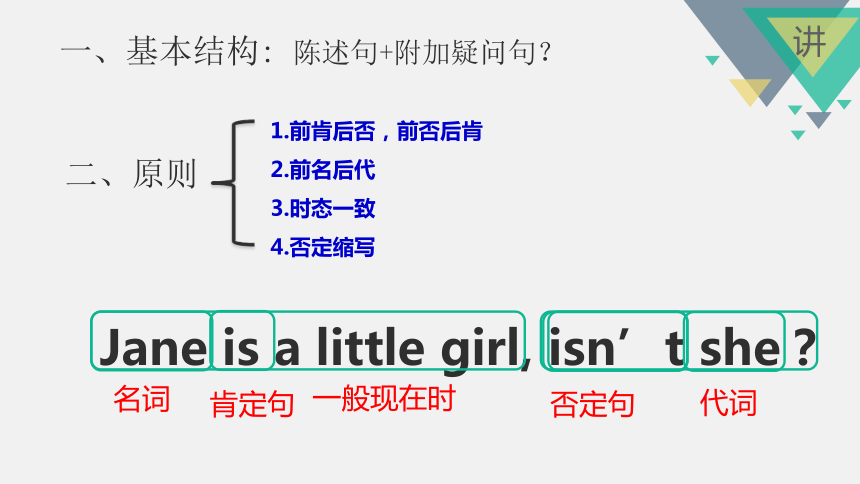
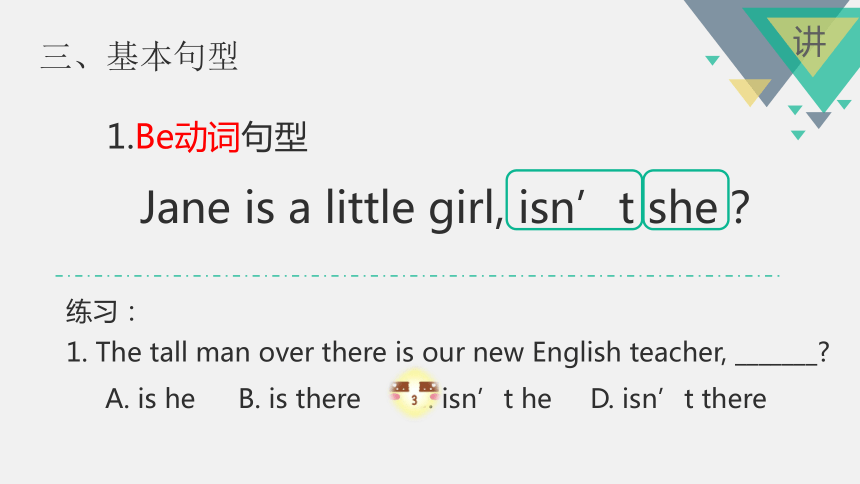
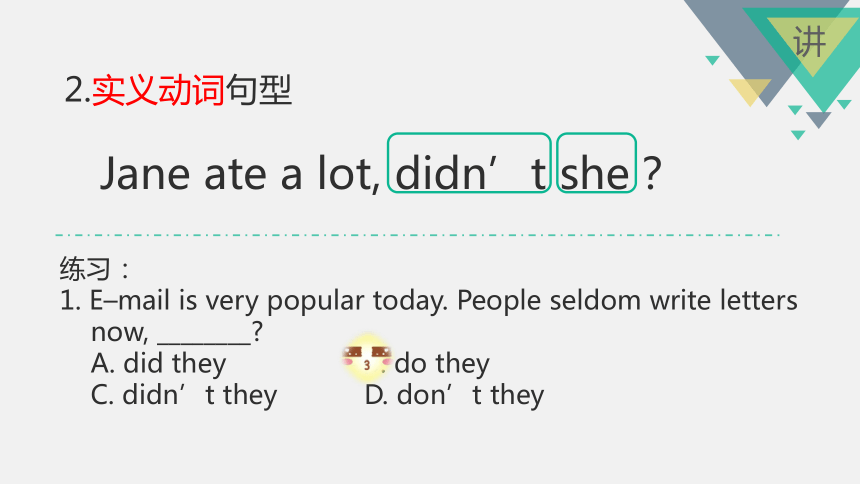
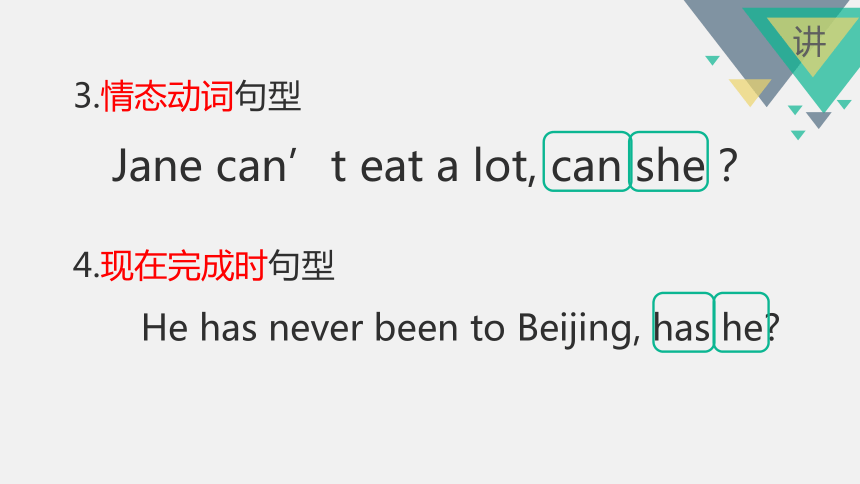
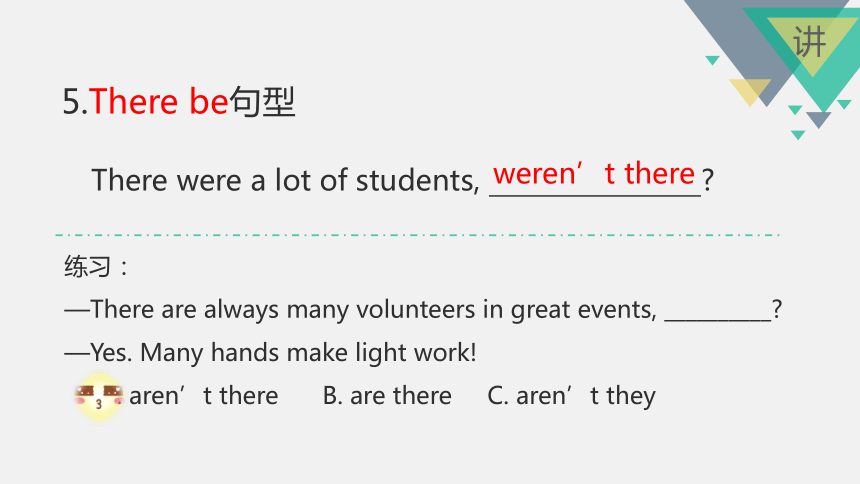
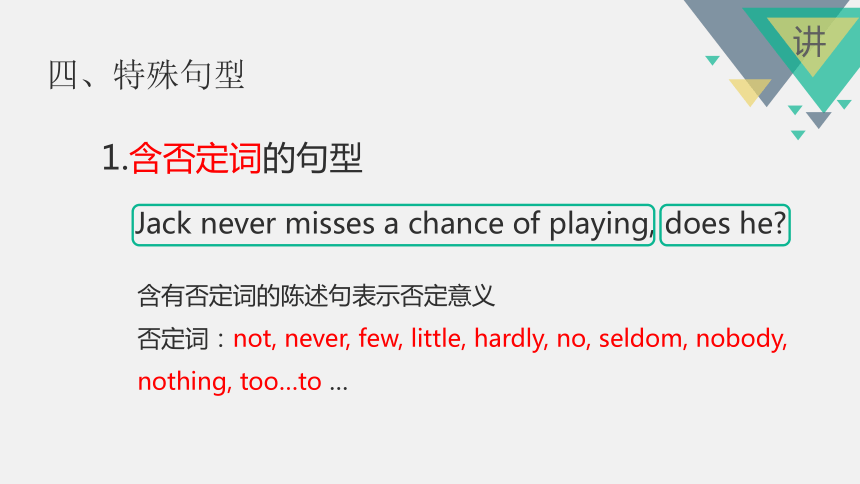
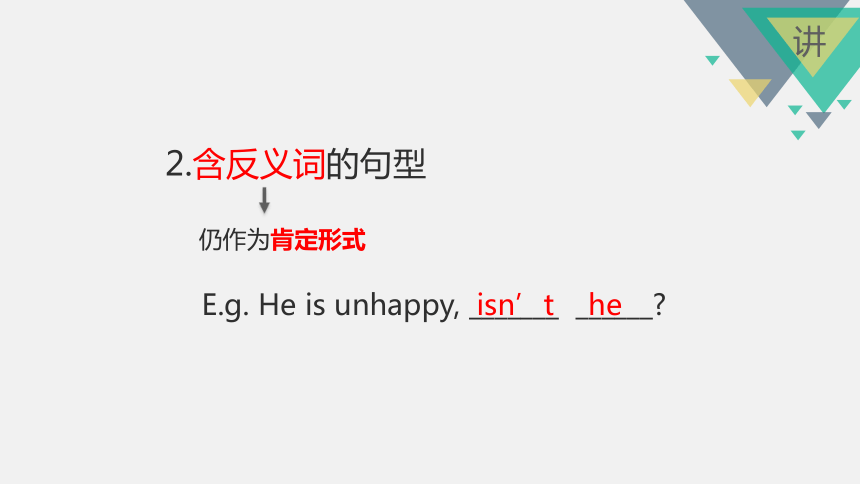
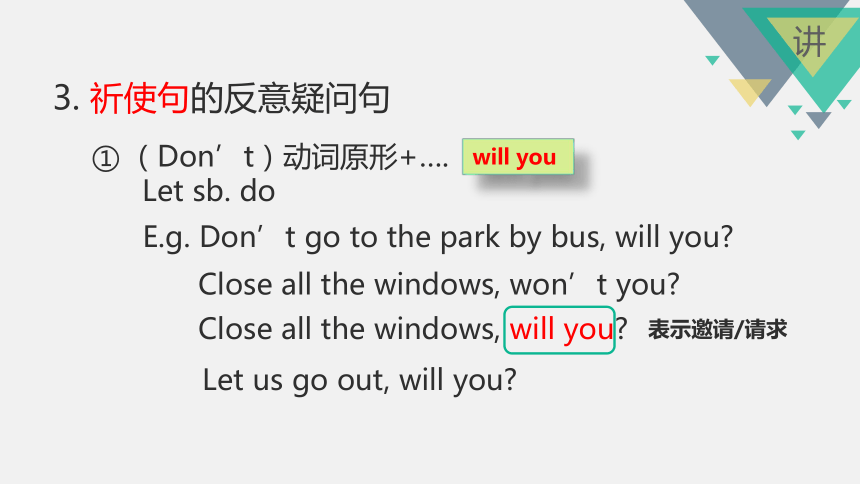
文档简介
(共24张PPT)
反义疑问句
讲
二、原则
1.前肯后否,前否后肯
2.前名后代
3.时态一致
4.否定缩写
Jane is a little girl, isn’t she?
肯定句 否定句
名词
代词
一般现在时
一、基本结构: 陈述句+附加疑问句?
讲
三、基本句型
Jane is a little girl, isn’t she?
1.Be动词句型
练习:
1. The tall man over there is our new English teacher, _______
A. is he B. is there C. isn’t he D. isn’t there
讲
2.实义动词句型
练习:
1. E–mail is very popular today. People seldom write letters
now, ________
A. did they B. do they
C. didn’t they D. don’t they
Jane ate a lot, didn’t she?
讲
3.情态动词句型
Jane can’t eat a lot, can she?
4.现在完成时句型
He has never been to Beijing, has he
讲
5.There be句型
练习:
—There are always many volunteers in great events, __________
—Yes. Many hands make light work!
A. aren’t there B. are there C. aren’t they
There were a lot of students,
weren’t there
讲
四、特殊句型
1.含否定词的句型
含有否定词的陈述句表示否定意义
否定词:not, never, few, little, hardly, no, seldom, nobody, nothing, too…to …
Jack never misses a chance of playing, does he
2.含反义词的句型
仍作为肯定形式
E.g. He is unhappy, _______ ______
isn’t he
讲
讲
3. 祈使句的反意疑问句
Close all the windows, won’t you
E.g. Don’t go to the park by bus, will you
① (Don’t)动词原形+….
Let sb. do
Close all the windows, will you
表示邀请/请求
will you
Let us go out, will you
② Let’s do
E.g. Let’s go to see the pandas, shall we
shall we
Don’t forget to put the book back on the shelf, __________
A. do you B. don’t you
C. will you D. won you
练
1.—Let’s go fishing after the exam, __________
—Sounds great!
A. will you B. shall we C. won’t you
2. —Let’s go to the zoo by taxi, __________
—Maybe we can go there __________. It’s not far.
A. won’t you; on foot B. won’t you; by foot
C. shall we; by foot D. shall we; on foot
讲
4. 主语是不定代词
1)主语为指人的不定代词时,附加疑问句的主语用he/ they
E.g. No one was hurt, ______ _______
2)主语为指物的不定代词时,附加疑问句的主语用 it.
E.g. Nothing is serious, _______ _______
was he
is it
讲
5. 主语是this, that, these, those
附加疑问句的主语分别为 it , they
E.g. This is a new computer, ______ ______
Those aren’t banana trees, ______ _______
isn’t it
are they
E.g. They had a good time, __________ ______
② * 实义动词“吃、喝、玩、度过”
* have to
讲
6. 陈述句中动词有have
①实义动词“有”
E.g. He has few friends in the new school,
__________ ______
does
he
they
didn’t
助动词
have/助动词
讲
④ 现在完成时have/has done
E.g. He has never been to Beijing, ________ ______
has he
have/has
讲
7. 陈述句中动词有need
①实义动词——助动词
E.g. She needs to go home alone, doesn’t
she
②情态动词——need
E.g. We need not do it again, need we
讲
8. 陈述句中动词有must
①表示“必须”——needn’t
E.g. They must come on time, needn’t they
②表推测“想必”——根据must后的动词决定
E.g. He must be there now, isn't he
It must be going to rain tomorrow, won't it
讲
9. 陈述部分为主从复合句
1)并列复合句疑问部分,谓语动词根据邻近从句的谓语而定。
E.g. Mr. Smith had been to Beijing for several times, he should have been in China now, shouldn't he
2)带有定语从句,宾语从句的主从复合句,疑问部分谓语根据主句的谓语而定:
E.g. He is not the man who gave us a talk, is he
He said he wanted to visit Japan, didn't he
讲
3)当前面陈述部分是由动词think(expect, believe, guess, imagine, suppose)be/feel sure, be afraid构成的宾从时,反意疑问句与主要信息的宾语从句相一致。
E.g. I'm sure you'll help her, won't you
4)否定已前移时,反意疑问句与主要信息的宾语从句相一致同时根据“前否后肯”原则进行。
E.g. I don’t think you'll help her, will you
讲
五、答语
按实际情况回答:
E.g. ---There is a little girl under the tree, isn’t there
--- . She is my younger sister.
Yes, there is.
练
2. —She doesn’t like geography, does she
— __________.
A. Yes, she does B. Yes, she doesn’t
C. No, she does
1. —It’s a nice day, isn’t it
— __________. Let’s go hiking in the mountain.
A. Yes, it does B. No, it isn’t
C. It doesn’t matter D. Yes, it is
1. — He’s already gone to Australia, __________
— __________. He is on a visit to Shanghai.
A. isn’t he; No B. hasn’t he; Yes
C. isn’t he; Yes D. hasn’t he; No
2. —You didn’t go to school yesterday, did you
— __________, though there was a heavy rain.
A. Yes, I did B. No, I didn’t
C. Yes, I didn’t D. No, I did
练
hanks
You
反义疑问句
讲
二、原则
1.前肯后否,前否后肯
2.前名后代
3.时态一致
4.否定缩写
Jane is a little girl, isn’t she?
肯定句 否定句
名词
代词
一般现在时
一、基本结构: 陈述句+附加疑问句?
讲
三、基本句型
Jane is a little girl, isn’t she?
1.Be动词句型
练习:
1. The tall man over there is our new English teacher, _______
A. is he B. is there C. isn’t he D. isn’t there
讲
2.实义动词句型
练习:
1. E–mail is very popular today. People seldom write letters
now, ________
A. did they B. do they
C. didn’t they D. don’t they
Jane ate a lot, didn’t she?
讲
3.情态动词句型
Jane can’t eat a lot, can she?
4.现在完成时句型
He has never been to Beijing, has he
讲
5.There be句型
练习:
—There are always many volunteers in great events, __________
—Yes. Many hands make light work!
A. aren’t there B. are there C. aren’t they
There were a lot of students,
weren’t there
讲
四、特殊句型
1.含否定词的句型
含有否定词的陈述句表示否定意义
否定词:not, never, few, little, hardly, no, seldom, nobody, nothing, too…to …
Jack never misses a chance of playing, does he
2.含反义词的句型
仍作为肯定形式
E.g. He is unhappy, _______ ______
isn’t he
讲
讲
3. 祈使句的反意疑问句
Close all the windows, won’t you
E.g. Don’t go to the park by bus, will you
① (Don’t)动词原形+….
Let sb. do
Close all the windows, will you
表示邀请/请求
will you
Let us go out, will you
② Let’s do
E.g. Let’s go to see the pandas, shall we
shall we
Don’t forget to put the book back on the shelf, __________
A. do you B. don’t you
C. will you D. won you
练
1.—Let’s go fishing after the exam, __________
—Sounds great!
A. will you B. shall we C. won’t you
2. —Let’s go to the zoo by taxi, __________
—Maybe we can go there __________. It’s not far.
A. won’t you; on foot B. won’t you; by foot
C. shall we; by foot D. shall we; on foot
讲
4. 主语是不定代词
1)主语为指人的不定代词时,附加疑问句的主语用he/ they
E.g. No one was hurt, ______ _______
2)主语为指物的不定代词时,附加疑问句的主语用 it.
E.g. Nothing is serious, _______ _______
was he
is it
讲
5. 主语是this, that, these, those
附加疑问句的主语分别为 it , they
E.g. This is a new computer, ______ ______
Those aren’t banana trees, ______ _______
isn’t it
are they
E.g. They had a good time, __________ ______
② * 实义动词“吃、喝、玩、度过”
* have to
讲
6. 陈述句中动词有have
①实义动词“有”
E.g. He has few friends in the new school,
__________ ______
does
he
they
didn’t
助动词
have/助动词
讲
④ 现在完成时have/has done
E.g. He has never been to Beijing, ________ ______
has he
have/has
讲
7. 陈述句中动词有need
①实义动词——助动词
E.g. She needs to go home alone, doesn’t
she
②情态动词——need
E.g. We need not do it again, need we
讲
8. 陈述句中动词有must
①表示“必须”——needn’t
E.g. They must come on time, needn’t they
②表推测“想必”——根据must后的动词决定
E.g. He must be there now, isn't he
It must be going to rain tomorrow, won't it
讲
9. 陈述部分为主从复合句
1)并列复合句疑问部分,谓语动词根据邻近从句的谓语而定。
E.g. Mr. Smith had been to Beijing for several times, he should have been in China now, shouldn't he
2)带有定语从句,宾语从句的主从复合句,疑问部分谓语根据主句的谓语而定:
E.g. He is not the man who gave us a talk, is he
He said he wanted to visit Japan, didn't he
讲
3)当前面陈述部分是由动词think(expect, believe, guess, imagine, suppose)be/feel sure, be afraid构成的宾从时,反意疑问句与主要信息的宾语从句相一致。
E.g. I'm sure you'll help her, won't you
4)否定已前移时,反意疑问句与主要信息的宾语从句相一致同时根据“前否后肯”原则进行。
E.g. I don’t think you'll help her, will you
讲
五、答语
按实际情况回答:
E.g. ---There is a little girl under the tree, isn’t there
--- . She is my younger sister.
Yes, there is.
练
2. —She doesn’t like geography, does she
— __________.
A. Yes, she does B. Yes, she doesn’t
C. No, she does
1. —It’s a nice day, isn’t it
— __________. Let’s go hiking in the mountain.
A. Yes, it does B. No, it isn’t
C. It doesn’t matter D. Yes, it is
1. — He’s already gone to Australia, __________
— __________. He is on a visit to Shanghai.
A. isn’t he; No B. hasn’t he; Yes
C. isn’t he; Yes D. hasn’t he; No
2. —You didn’t go to school yesterday, did you
— __________, though there was a heavy rain.
A. Yes, I did B. No, I didn’t
C. Yes, I didn’t D. No, I did
练
hanks
You
同课章节目录
- 词法
- 名词
- 动词和动词短语
- 动词语态
- 动词时态
- 助动词和情态动词
- 非谓语动词
- 冠词
- 代词
- 数词和量词
- 形容词副词及其比较等级
- 介词和介词短语
- 连词和感叹词
- 构词法
- 相似、相近词比较
- 句法
- 陈述句
- 一般疑问句和否定疑问句
- 特殊疑问句及选择疑问句
- 反意疑问句
- 存在句(There be句型)
- 宾语从句
- 定语从句
- 状语从句
- 主谓一致问题
- 简单句
- 并列句
- 复合句
- 主谓一致
- 主、表语从句
- 名词性从句
- 直接引语和间接引语
- 虚拟语气
- 感叹句
- 强调句
- 倒装句
- 祈使句
- 句子的成分
- 句子的分类
- 题型专区
- 单项选择部分
- 易错题
- 完形填空
- 阅读理解
- 词汇练习
- 听说训练
- 句型转换
- 补全对话
- 短文改错
- 翻译
- 书面表达
- 任务型阅读
- 语法填空
- 其他资料
